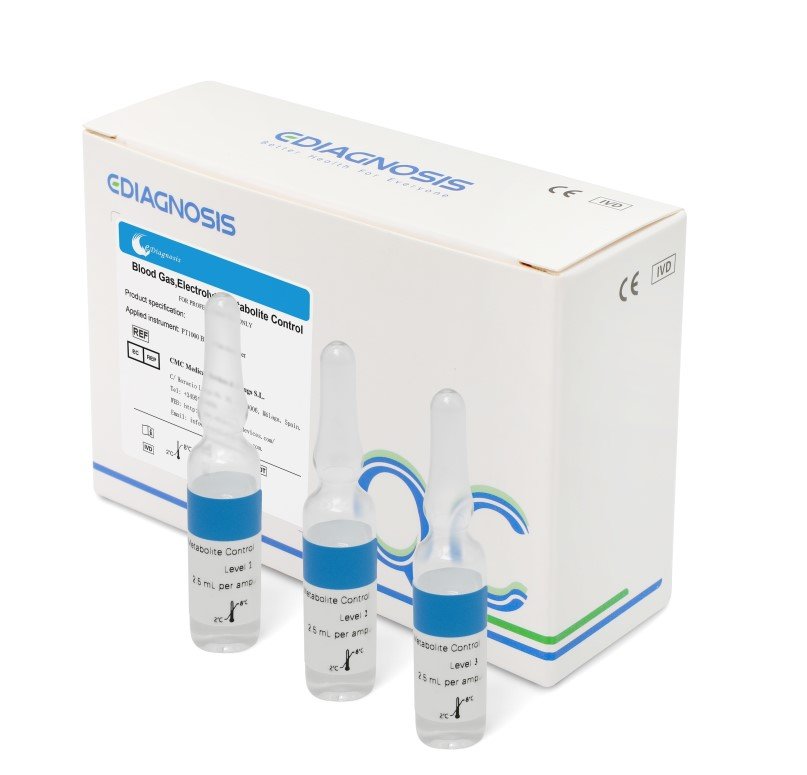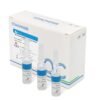Table of Contents
Blood Gas Reagents
Blood Gas Reagents are specialized chemical solutions used in blood gas analyzers to measure the concentrations of gases like oxygen (O₂), carbon dioxide (CO₂), and other parameters such as pH, bicarbonate (HCO₃⁻), and electrolytes in a blood sample. These reagents play a critical role in ensuring the accuracy and precision of blood gas testing, which is essential for diagnosing and managing respiratory and metabolic disorders.
Key components of blood gas reagents include:
1. Calibrators:
These are solutions with known concentrations of gases and other analytes used to calibrate the blood gas analyzer, ensuring that the device provides accurate measurements.
2. Buffers:
These are used to maintain a stable pH in the system, ensuring that the blood sample’s pH is accurately measured without fluctuation during the analysis.
3. Electrolyte Solutions:
Blood gas analyzers often measure electrolytes (like sodium, potassium, calcium) in addition to gases, and specialized reagents are needed for this purpose.
4. Quality Control Reagents:
These are used to verify the performance of the blood gas analyzer by running tests with known results, ensuring that the machine operates correctly over time.
Blood gas reagents are critical for ensuring the accuracy of results in clinical settings, which in turn guide treatment decisions in conditions such as respiratory failure, metabolic acidosis, and other critical illnesses.
Blood Gas Control
Blood gas control refers to the regulation of the levels of gases, primarily oxygen (O₂) and carbon dioxide (CO₂), in the blood, as well as the balance of pH. This process is essential for maintaining the body’s acid-base balance and ensuring that tissues receive adequate oxygen while eliminating carbon dioxide.

What is Blood gas control?
Blood gas control refers to the body’s regulation of oxygen (O₂), carbon dioxide (CO₂), and pH levels in the blood. These components are essential for maintaining the body’s acid-base balance and ensuring that cells receive enough oxygen to function while eliminating waste products like CO₂. This process is managed by the lungs, kidneys, and buffer systems in the body.
Key factors in blood gas control include:
1. Oxygen (O₂) levels:
The body needs a proper supply of oxygen to function. Blood gas tests measure the amount of oxygen in the blood to ensure tissues are being adequately oxygenated.
2. Carbon dioxide (CO₂) levels:
CO₂ is a waste product of metabolism. The body regulates its levels by breathing it out. High levels of CO₂ can cause the blood to become too acidic, a condition called acidosis.
3. pH balance:
The blood’s pH indicates whether it is too acidic or too alkaline. The normal blood pH range is 7.35-7.45. The body regulates pH through mechanisms such as the respiratory system (by controlling CO₂) and the kidneys (by excreting or conserving bicarbonate).
4. Bicarbonate (HCO₃⁻) levels:
This acts as a buffer to maintain the blood’s pH. It neutralizes excess acids and is regulated by the kidneys.
What is the importance of blood gas control?
Blood gas control is crucial for maintaining homeostasis, which is essential for the normal functioning of the body. The importance of blood gas control includes the following:
1. Maintains Proper Oxygenation:
Adequate control of blood gases ensures that oxygen levels are maintained within a range that allows cells and tissues to function efficiently. Low oxygen levels (hypoxemia) can lead to tissue damage, organ failure, and even death.
2. Regulates Acid-Base Balance:
Blood gas control helps regulate the pH of the blood, which is vital for enzyme activity, protein function, and metabolic processes. A proper pH range (7.35-7.45) is necessary to keep cellular and systemic functions intact. Imbalances can lead to conditions such as acidosis (too much acid) or alkalosis (too much base), which disrupt body systems.
3. Supports Respiratory Function:
Proper control of carbon dioxide (CO₂) levels helps maintain the balance between breathing and metabolic processes. Increased CO₂ levels can cause respiratory acidosis, leading to shortness of breath, confusion, or even unconsciousness, while low CO₂ levels can lead to respiratory alkalosis.
4. Affects Cardiovascular Function:
Imbalances in blood gases can strain the heart and circulatory system. For example, if oxygen levels are too low or CO₂ levels are too high, the heart may work harder to pump oxygenated blood throughout the body.
5. Prevents Metabolic Disturbances:
Blood gas control is important for preventing metabolic disorders. If pH or bicarbonate levels become too imbalanced, it may point to underlying kidney or endocrine disorders that need to be addressed.
6. Guides Clinical Decision-Making:
In critical care and emergency settings, blood gas measurements (arterial blood gas tests or ABGs) are used to assess a patient’s respiratory and metabolic status. It helps guide interventions like oxygen therapy, mechanical ventilation, or treatment for acid-base imbalances.
Maintaining proper blood gas control is vital for overall health, as disturbances can lead to severe complications in respiratory, cardiovascular, and metabolic systems.




Reviews
There are no reviews yet.